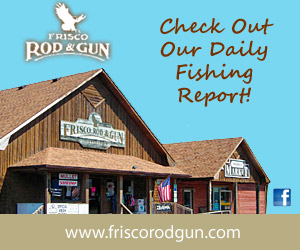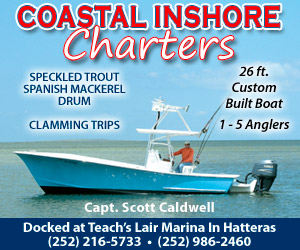
The agenda has been set for the quarterly meeting of the North Carolina Marine Fisheries Commission to be held in Raleigh next week, in the midst of a war of words with the NC Wildlife Resources Commission about a recreational flounder season taking place this year.
Only one item on the agenda of the Aug. 21-23 meeting at the Hilton Raleigh North Hills mentions flounder, which is a report from N.C. Division of Marine Fisheries staff on the Southern Flounder Stock Assessment Update and 2023 Southern Flounder landings.
That report is expected to be the basis for a decision on how much quota is available for a commercial season in the sounds and coastal rivers that has previously taken place in September and October.
Meanwhile, Marine Fisheries Commission Chairman Rob Bizzell continues to insist that his panel will not open the flounder fishery to recreational anglers this year.
That’s despite a vote last month by the N.C. Wildlife Resources Commission to open recreational, hook-and-line season for September 1, 2, 7 and 8, with a daily limit of one-fish per angler and a minimum size of 15 inches, in the waters that fall under their jurisdiction.
That includes the joint waters that the Marine Fisheries Commission also oversees.
WRC chair Monty Crump have been trading letters over the past month, with Crump asking Bizzell to hold an emergency meeting to reconsider how Southern Flounder are allocated between recreational and commercial sectors and allow a recreational flounder season in all waters.
Bizzell reiterated previous statements that the Marine Fisheries Commission will be sticking to its plans adopted this spring to not allow a recreational season for flounder fishing this year.
Bizzell also said that fisherman who try to keep flounder caught in, or transported through, both coastal and joint waters will be subject to enforcement efforts of the N.C. Marine Patrol.
North Carolina waters are regulated by two separate commissions that are composed of members who are actively involved in fishing and/or hunting, either recreationally or professionally.
The Marine Fisheries Commission, a nine-member panel appointed by the governor, covers the Atlantic Ocean, and the coastal sounds and rivers up to a certain geographic point.
The jurisdiction of the Wildlife Resources Commission, which has 19 members that are appointed by the governor and the General Assembly, includes parts of those same coastal sounds and rivers, known as joint waters, along with all inland waterways.

The waters marked in red are considered Joint Waters. [NCDMF map]
Certain freshwater species, such as largemouth bass and sunfish, are managed exclusively by the Wildlife Resources Commission, while saltwater species like red drum and speckled trout are managed by the Marine Fisheries Commission.
But the two commissions overlap when it comes to flounder, striped bass, and a few others that spend at least part of their lives in both of their waters.
The Marine Fisheries Commission voted in May to not allow a recreation season for any type of flounder in North Carolina’s coastal waters “in order to preserve the Southern flounder resource”, the commission said in a news release.
A roughly two-week long season has taken place in September in the northern half of the coast in recent years.
Three distinct species of flounder are found in North Carolina’s coastal waters: Summer, Gulf and Southern flounder.
While only Southern flounder are considered “overfished and overfishing is occurring” according to NCDMF, the entire flounder fishery has been impacted by the closures, in-part, because it is assumed many anglers have difficulty determining which species they have caught.
North Carolina has put strict limits on flounder fishing in recent years, including the limited seasons or outright closures, neighbors to the north and south have been much more liberal.
Recreational anglers in Virginia can keep four flounder per day that are at least 16 inches long before May 31, and 17.5 inches long after June 1. The primary species found there is Summer flounder.
South Carolina allows 5 flounder per person, per day with a minimum length of 16 inches.
Along with the two separate management structures for fishing in North Carolina waters, there are also separate law enforcement agencies that are overseen by the WRC and MFC.
N.C. Wildlife Resources Commission Law Enforcement has jurisdiction on all of North Carolina’s coastal and interior waters when it comes to boating activities. They also enforce fishing regulations on inland and joint waters.
Commonly referred to as “game wardens”, there were 208 WRC officers statewide as of late 2023, with plans to expand the force to 224 approved by the General Assembly last year.
The North Carolina Marine Patrol also enforces boating laws, but their primary focus is recreational and commercial fishing regulations in the coastal and joint waters.
There are just 56 officers in the Marine Patrol that monitor 2.5 million acres of water and over 4,000 miles of coastline.
Despite those challenges, Bizzell told Crump that the MFC’s decision on flounder fishing this year will still be enforced.
The Marine Fisheries Commission meeting will begin at 6 p.m. on Wednesday, Aug. 21; at 9 a.m. on Thursday, Aug. 22; and at 9 a.m. on Friday, Aug. 23. The commission will hold public comment sessions at 6 p.m. on Wednesday, Aug. 21, and at 9 a.m. on Thursday, Aug. 22.
Other agenda items include:
Agenda items for this meeting include:
- A presentation on the Draft Spotted Seatrout Fishery Management Plan Amendment 1, including information about the Division’s preliminary recommendations, and a vote to approve the draft amendment for public and advisory committee review.
- A report on the Southern Flounder Stock Assessment Update and 2023 Southern Flounder landings.
- A presentation on the division’s Annual Fishery Management Plan Review.
- An overview of Submerged Aquatic Vegetation and its management in North Carolina.
- Votes on notice of text to begin the rulemaking process to amend or adopt the below three issues. The proposed rules will go to public hearing at a later date.
- 15A NCAC 03J .0301 to Simplify Pot Marking Requirements
- 15A NCAC 03M .0523 for False Albacore Management
- 15A NCAC 03O .0601-.0606 for the Interstate Wildlife Violator Compact
- A vote to set the annual cap for the number of Standard Commercial Fishing Licenses available through the Eligibility Pool.
- Presentations on the division’s:
- Carcass Collection Program
- C. Saltwater Fishing Tournament
- C. Saltwater State Record Fish
- Multi-Species Tagging Program
- Election of a vice chair.
The following information pertains to in-person public comment:
- Those who wish to speak may sign up at the hotel prior to the public comment period in which they wish to speak.
- To accommodate as many speakers as possible, the chair will limit each speaker to 3 minutes.
- Those making comments will be asked to speak only once, either Wednesday night or Thursday morning, but not during both public comment periods.
- Those who wish to submit handouts to the commission during a public comment period should bring at least 12 copies to the meeting.
The public may also submit written comments via the following methods:
- An online form accessible through the Marine Fisheries Commission Meetings webpage.
- Mail to August 2024 Marine Fisheries Commission Meeting Comments, P.O. Box 769, Morehead City, N.C. 28557.
- Dropped off at the Division of Marine Fisheries’ Morehead City Headquarters Office at 3441 Arendell St., Morehead City.
The deadline to submit written comments for this meeting is 4 p.m. on Monday, Aug. 19.
The meeting will also be live-streamed on YouTube, with a link posted on the Marine Fisheries Commission Meetings webpage. After the meeting, a recording will be posted online.





